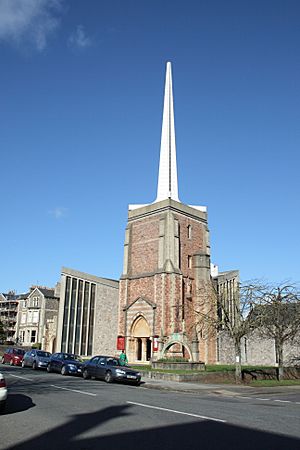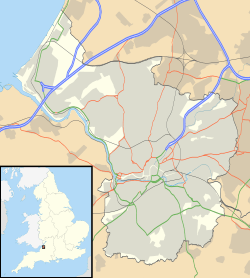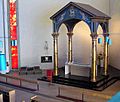Church of All Saints, Clifton facts for kids
Quick facts for kids Church of All Saints, Clifton |
|
|---|---|
| All Saints with St John, Clifton | |

The old red-brick tower with later concrete extensions
|
|
| 51°27′44″N 2°36′58″W / 51.4623°N 2.6161°W | |
| Location | Pembroke Road, Clifton, Bristol, BS8 2HY |
| Country | England |
| Denomination | Church of England |
| Churchmanship | Anglo-Catholic |
| History | |
| Status | Active |
| Dedication | All Saints |
| Consecrated | 8 June 1868 (original) 1 July 1967 (rebuild) |
| Architecture | |
| Functional status | Parish church |
| Heritage designation | Grade II listed |
| Designated | 8 January 1959 |
| Administration | |
| Parish | All Saints with St. John Clifton |
| Deanery | Bristol West |
| Archdeaconry | Archdeaconry of Bristol |
| Diocese | Diocese of Bristol |
The Church of All Saints is a special church in Clifton, Bristol, England. It's part of the Church of England. This church is considered a very important historical building, known as a grade II listed building. It serves the local community as a parish church.
Contents
History of All Saints Church
Building the First Church
In 1862, people in Clifton decided they needed a large new church. They wanted it to be a free church, meaning no one had to pay to sit in certain seats. The church would follow the Anglo-Catholic style of worship.
The first church was built between 1868 and 1872. A famous architect named George Edmund Street designed it. The main part of the church, called the chancel, was officially opened on June 8, 1868.
Later, more parts were added. In 1909, a narthex (an entrance hall) was built by George Frederick Bodley. A sacristy (a room for church items) was added in 1928 by Frederick Charles Eden. The narthex also has a special area called the Chapel of Saint Richard of Chichester. This chapel was built to remember Richard Randall, who was the first vicar of All Saints.
The Church During World War II
During World War II, on December 2, 1940, a bomb hit the church. It caused a big fire that destroyed the chancel and the main part of the church, called the nave. Only the tower, the narthex, and the sacristy were left standing.
An architect named W. H. Randoll Blacking was chosen to rebuild the church. However, there were many delays, and he passed away before the work could start.
Rebuilding and New Design
In the 1960s, the decision was made to rebuild the church. Sir Basil Spence, who was Blacking's business partner, became the new architect. He changed the direction of the church so that the altar (the table used for services) now faces East.
The altar itself stands freely and has a special roof-like structure above it called a ciborium. Behind the font (where baptisms happen) are beautiful stained glass windows. These windows are made from fibre glass and were designed by the artist John Piper.
The new nave and altar were officially opened on July 1, 1967. In the same year, another stained glass window was put in the narthex. This window was designed by Christopher Webb, who had also worked with Blacking. It was the last window Webb designed before he passed away.
The Church of All Saints was officially recognized as a grade II listed building on January 8, 1959. This means it's an important historical building that needs to be protected.
All Saints Church Today
In 1978, the church of All Saints joined with St John's Church. They formed one larger parish called All Saints with St. John Clifton. St John's Church was later closed in 1980.
The church continues to be an active part of the community. It remains within the Anglo-Catholic style of the Church of England.
Notable People Connected to All Saints
Many interesting people have been part of the Church of All Saints.
- Cedric Bucknall was an organist at the church.
Clergy Who Served Here
- Henry Bromby was a former vicar. He later became the Dean of Hobart.
- Fabian Jackson was also a former vicar. He later became the Bishop of Trinidad.
- Diarmaid MacCulloch served as a deacon from 1987 to 1988. He later became a professor at the University of Oxford, studying church history.
- Richard Randall was the very first vicar of All Saints, serving from 1868 to 1892. He later became the Dean of Chichester.
Images for kids












